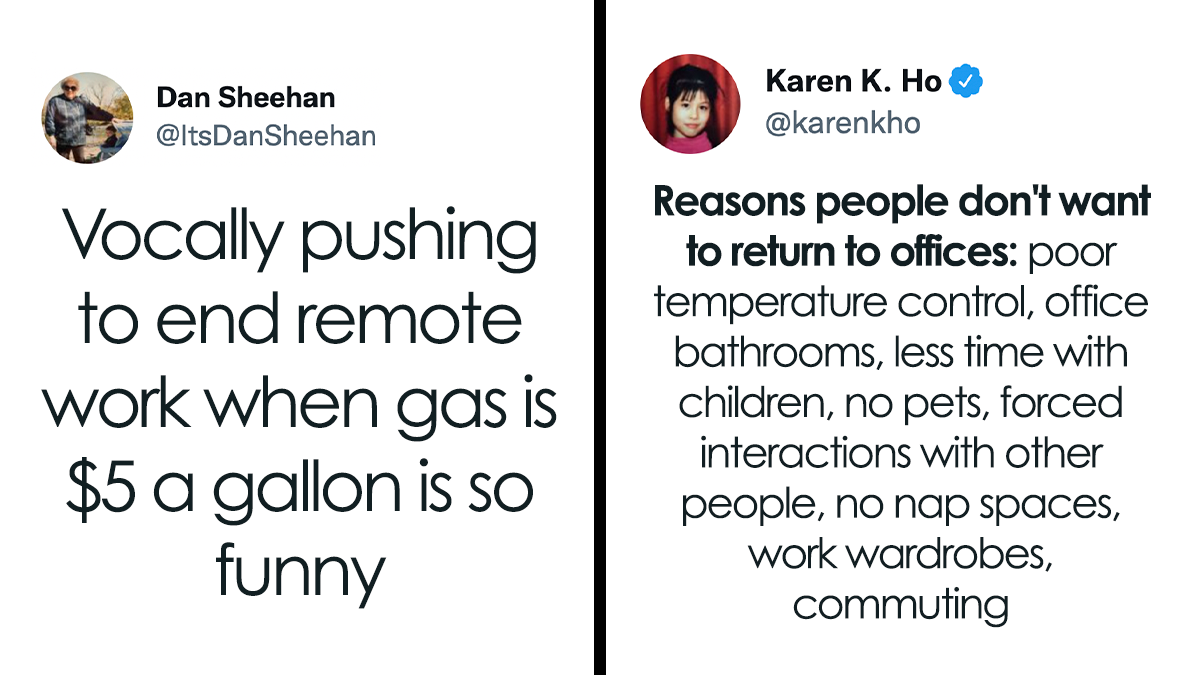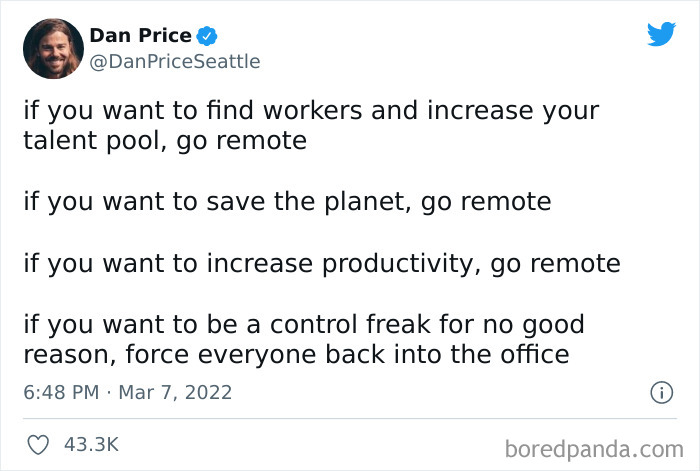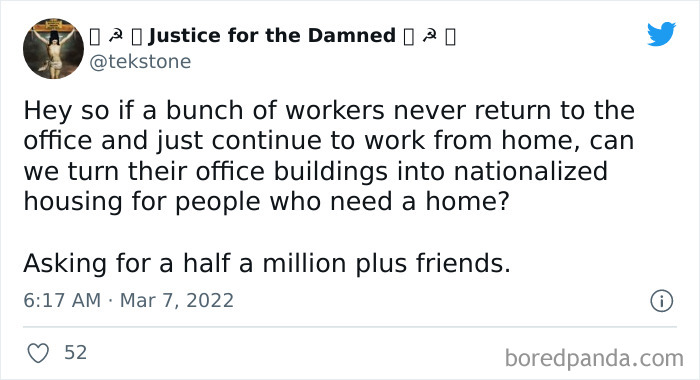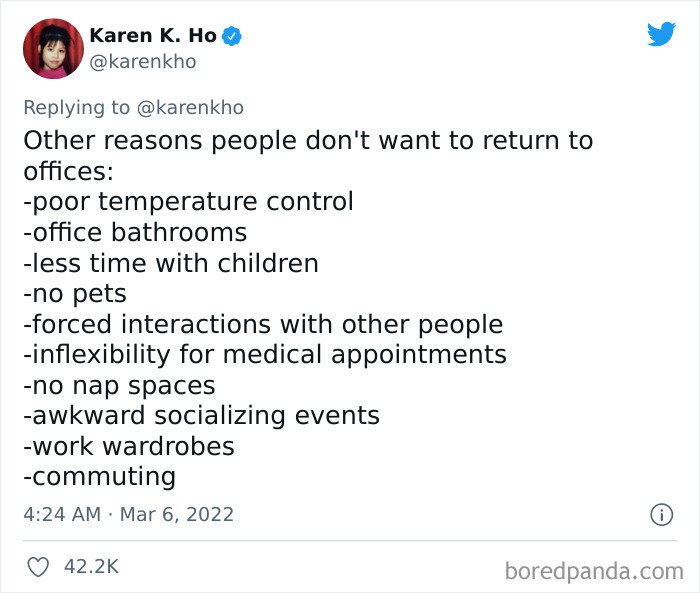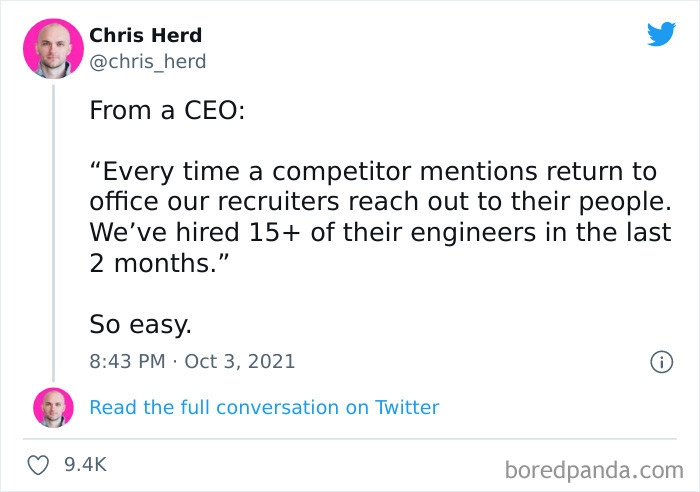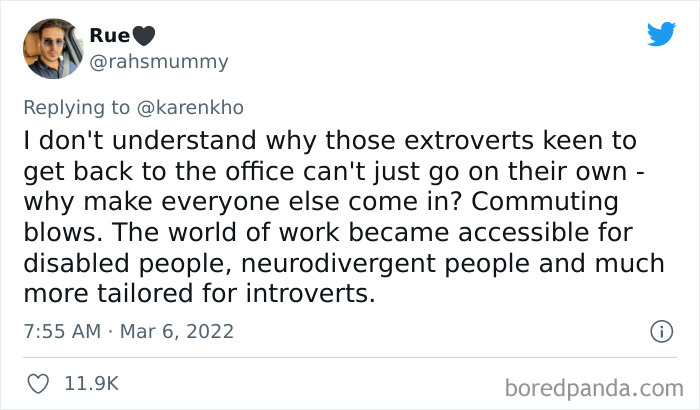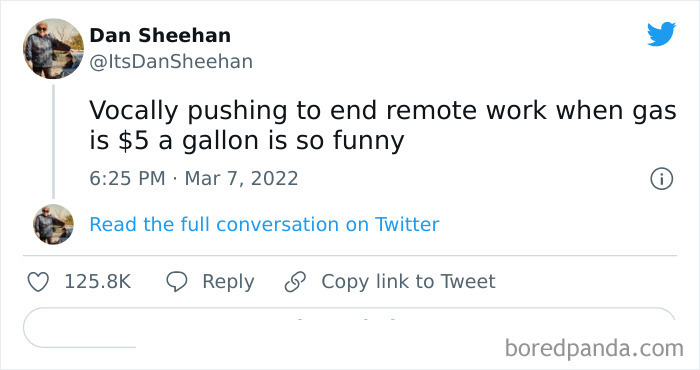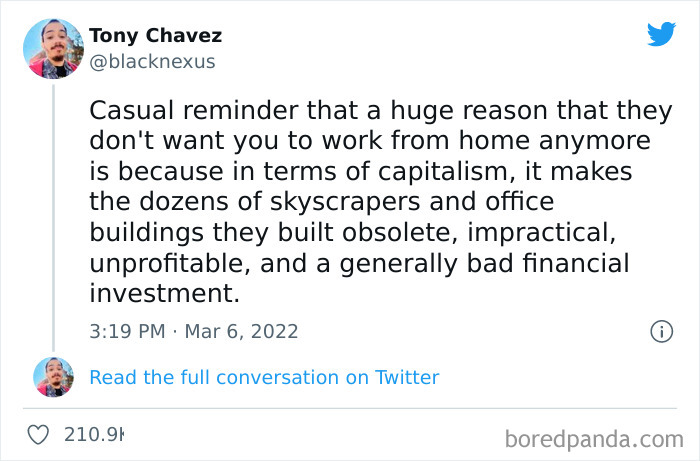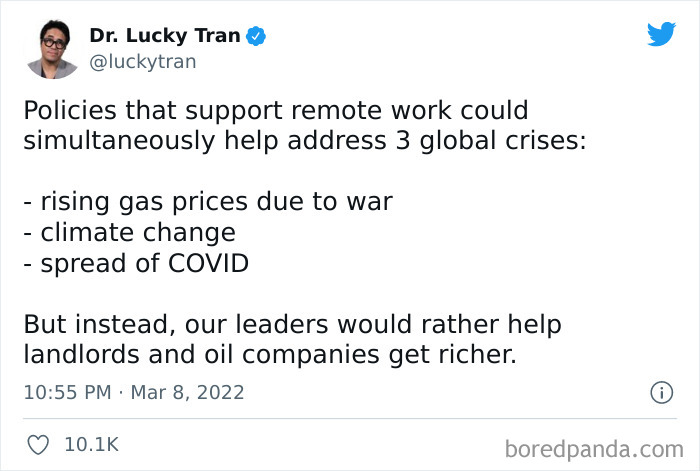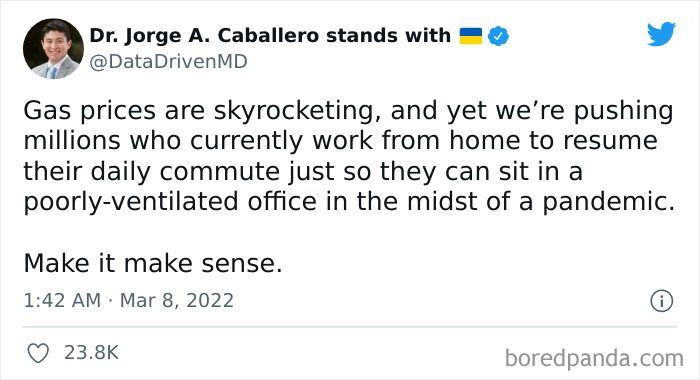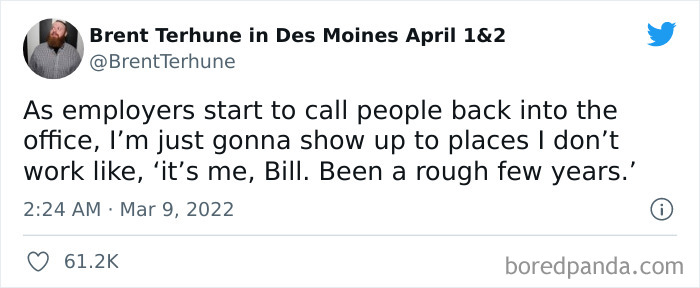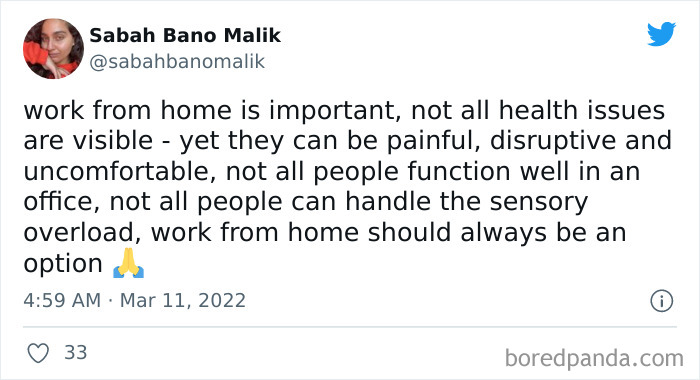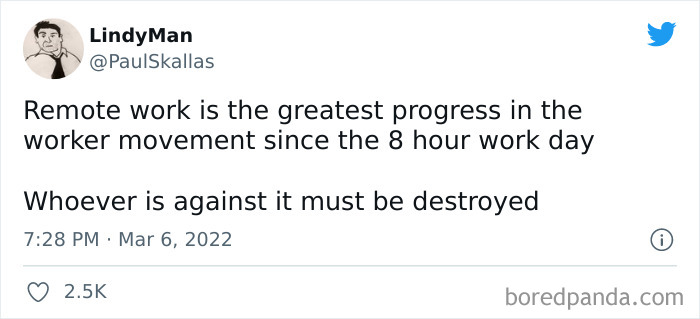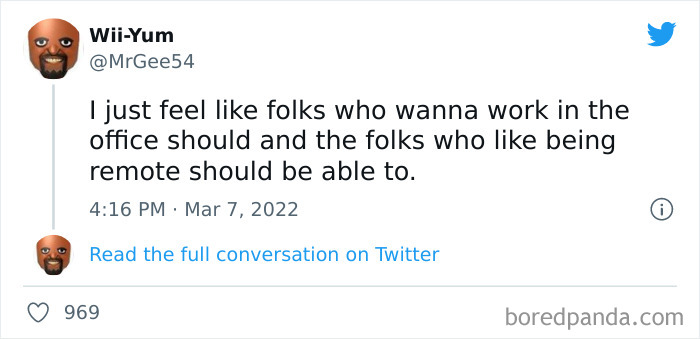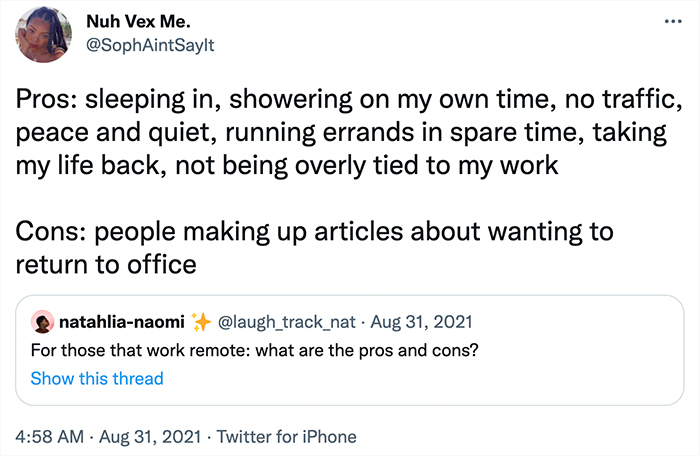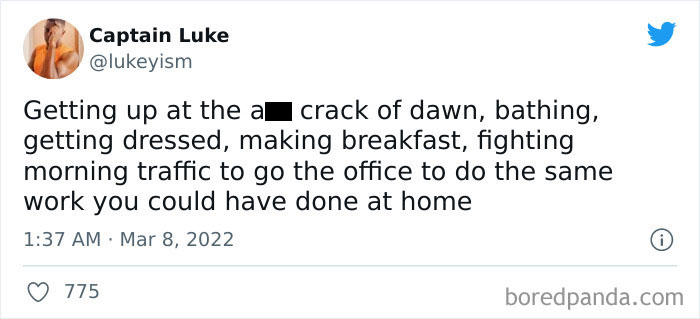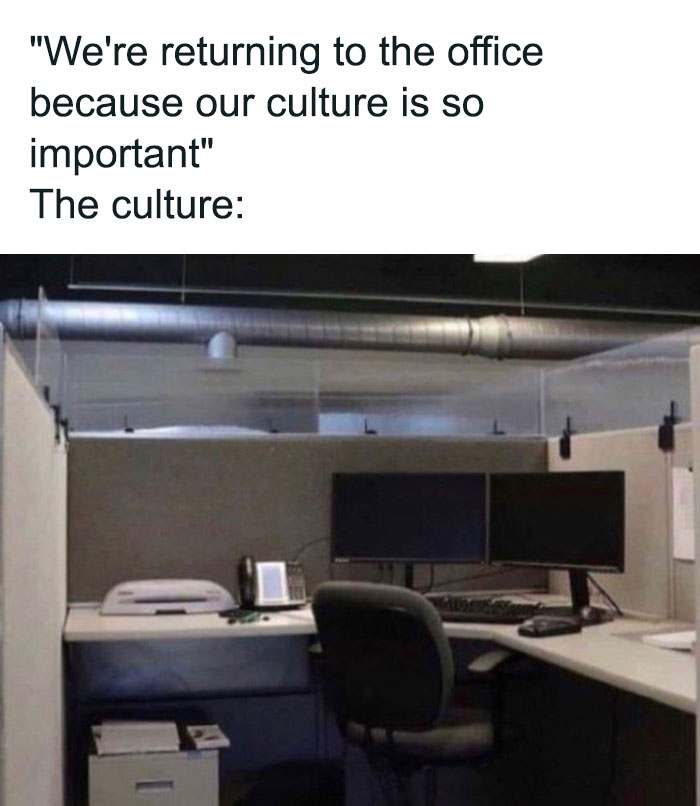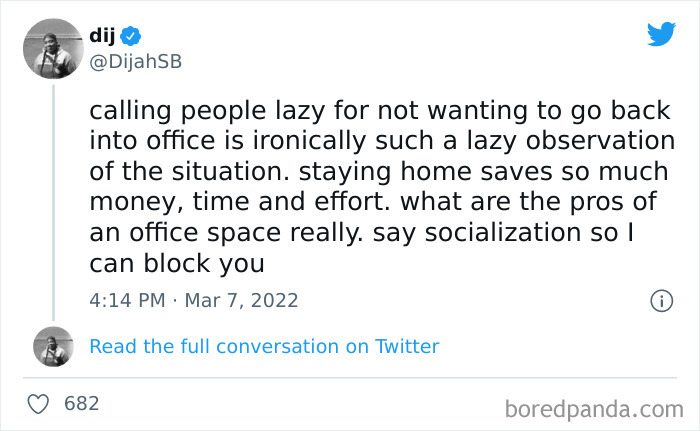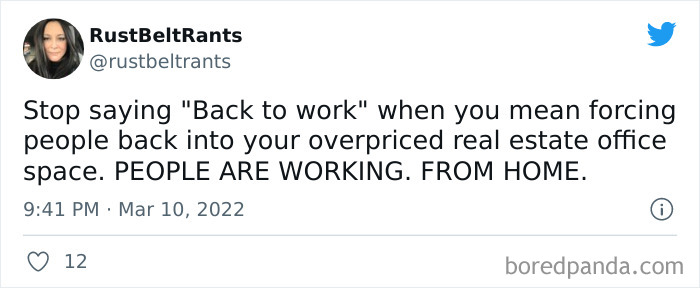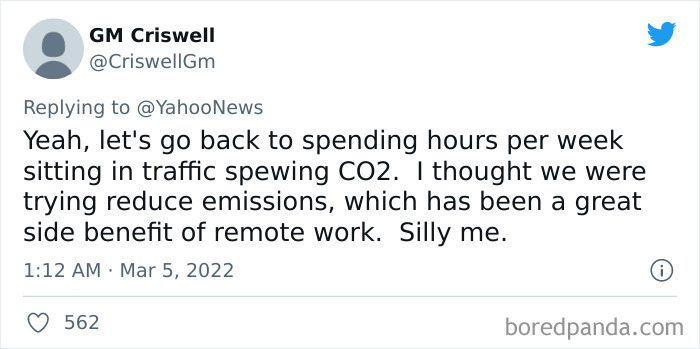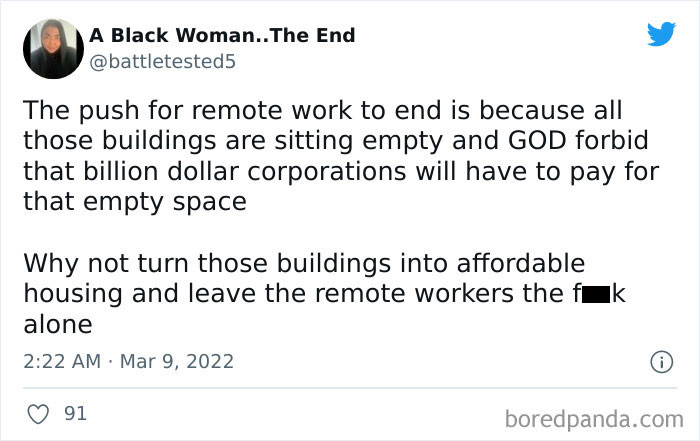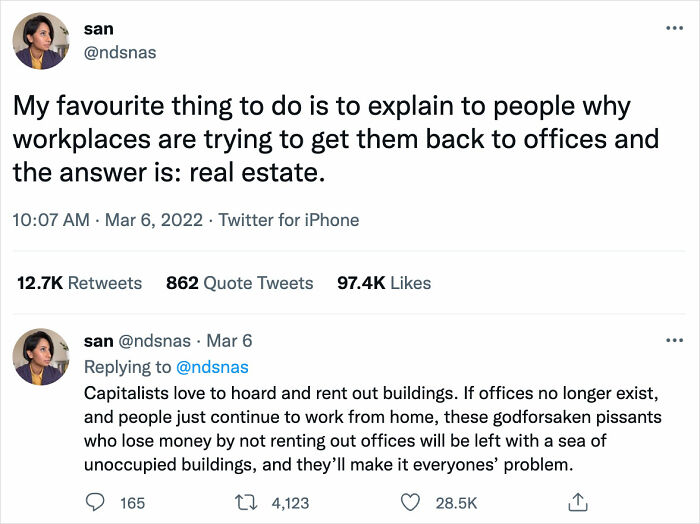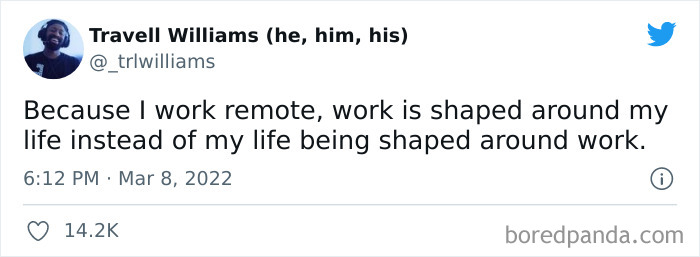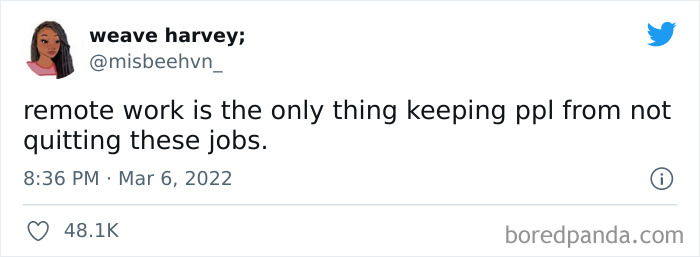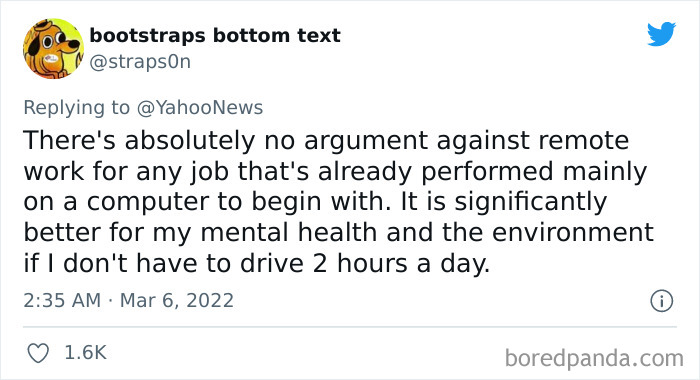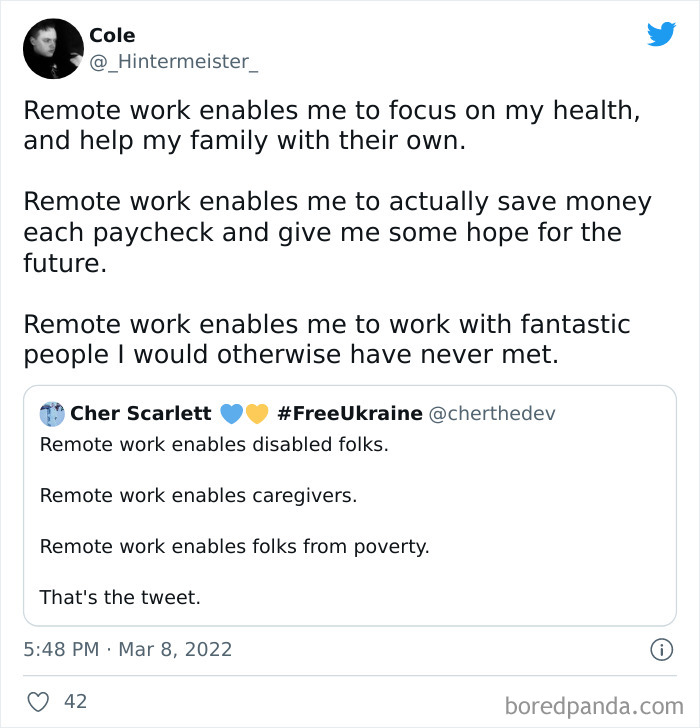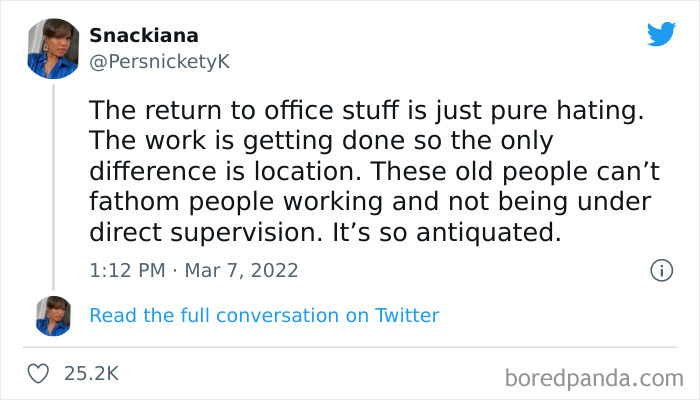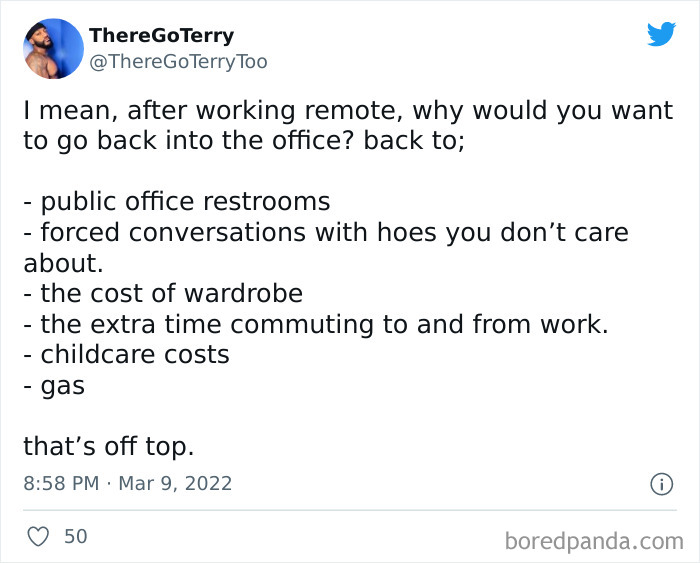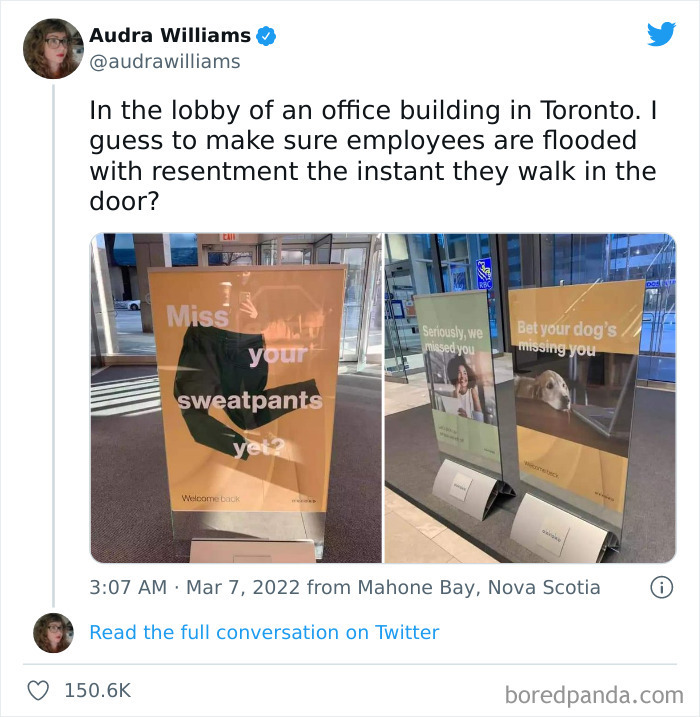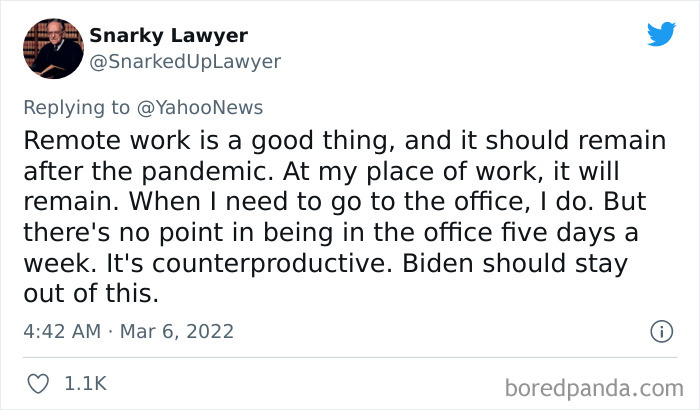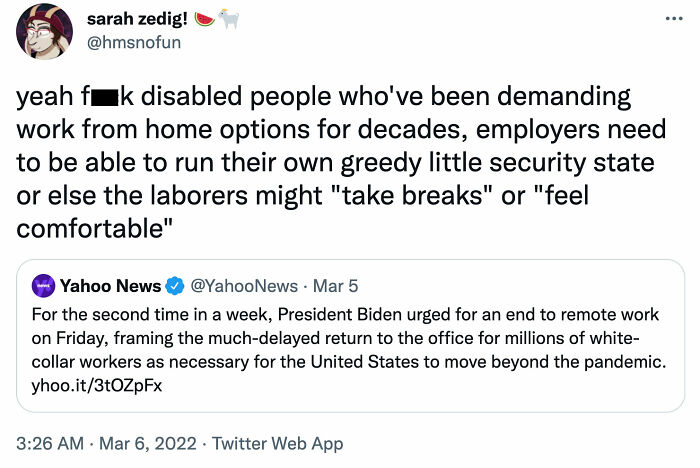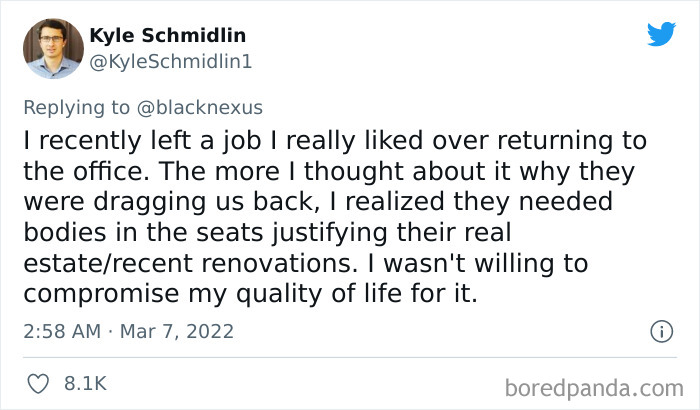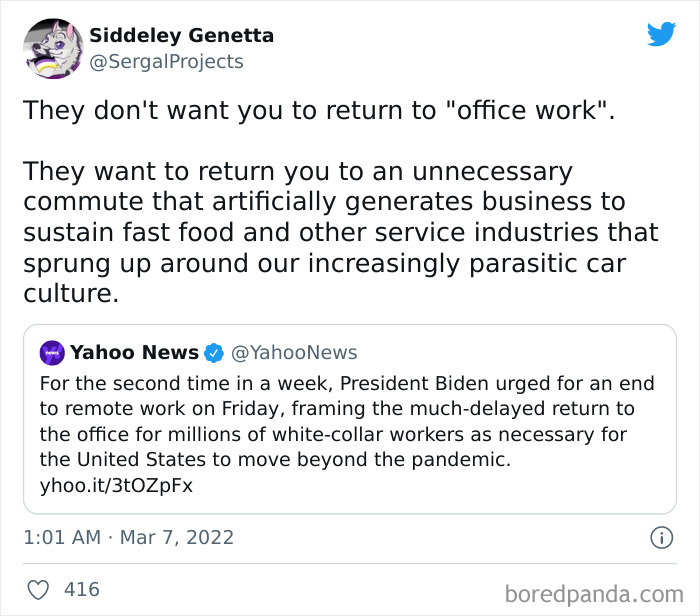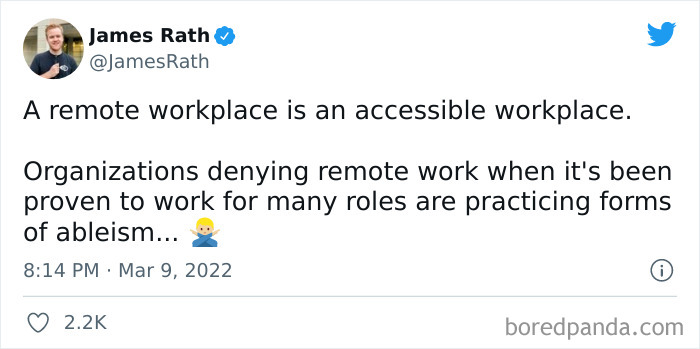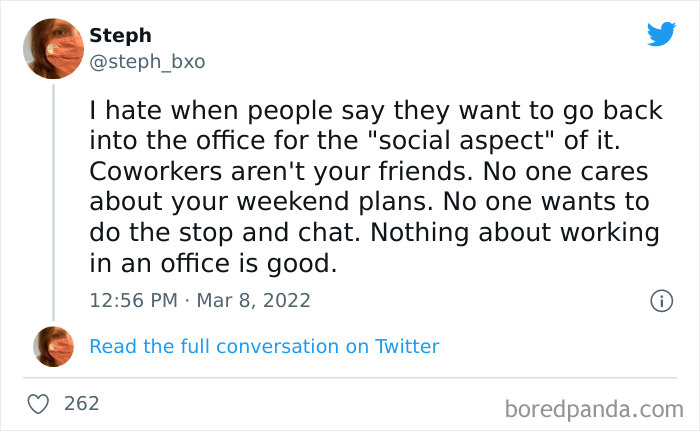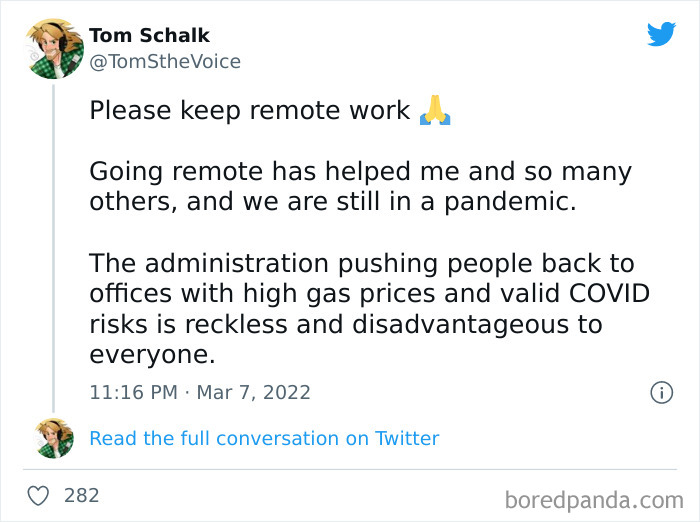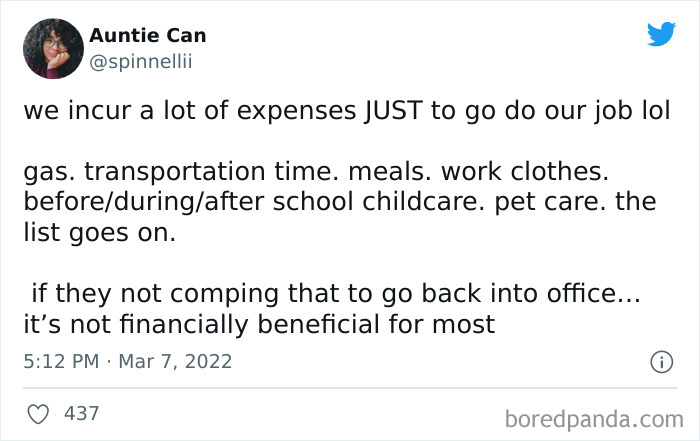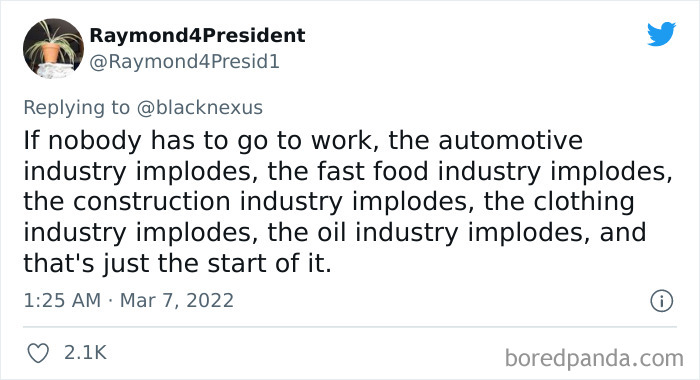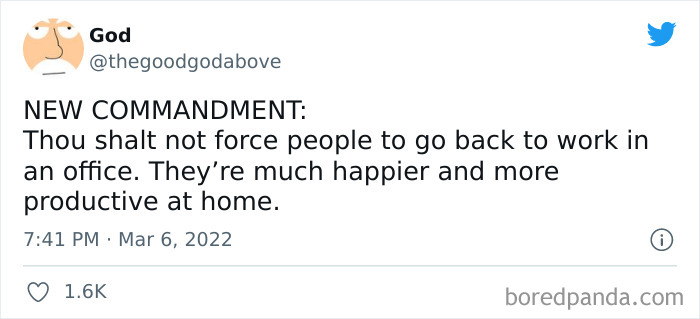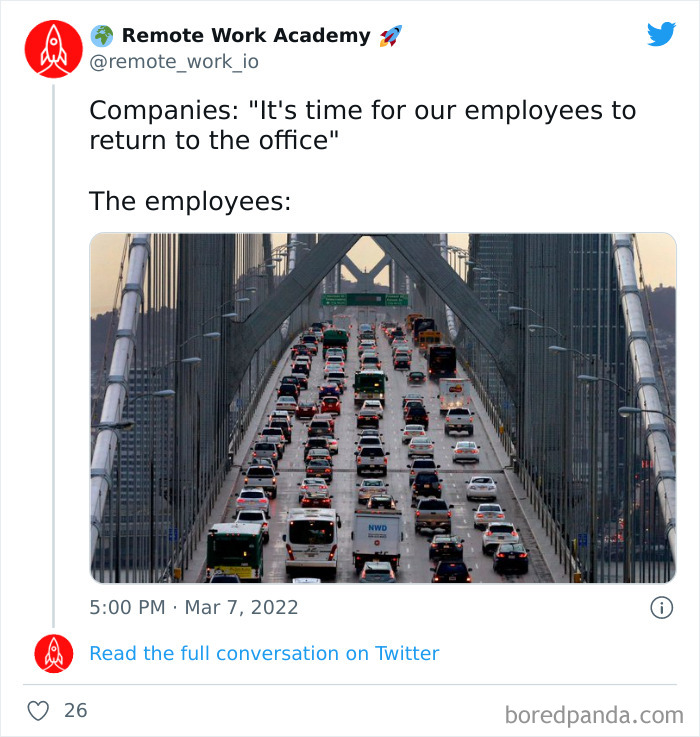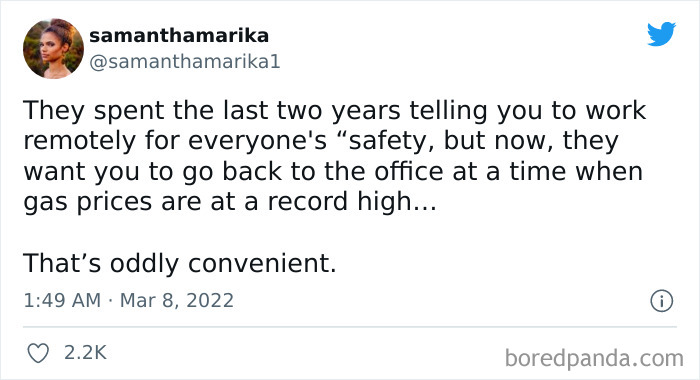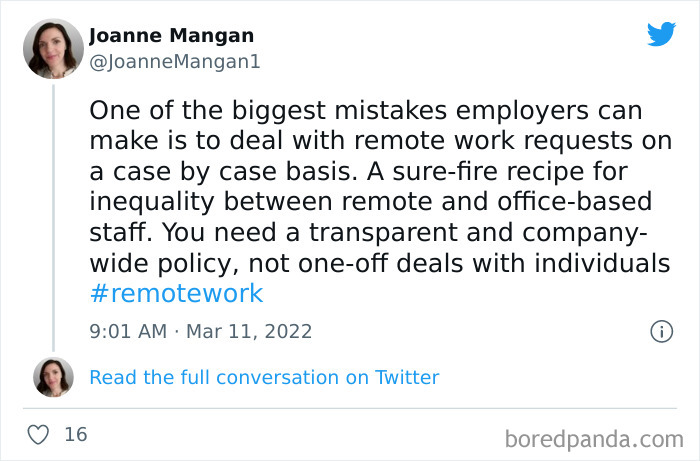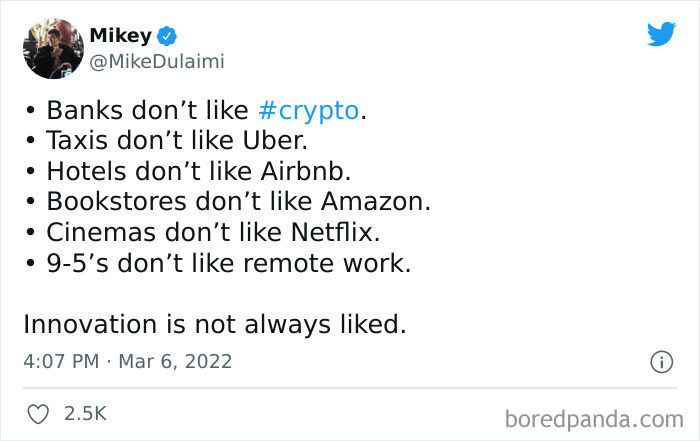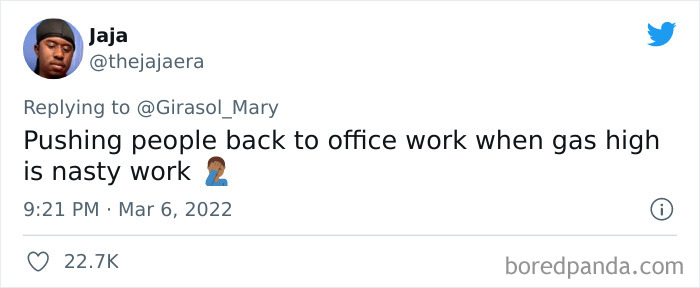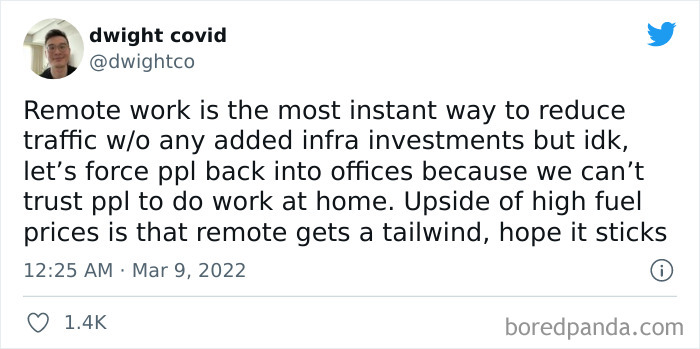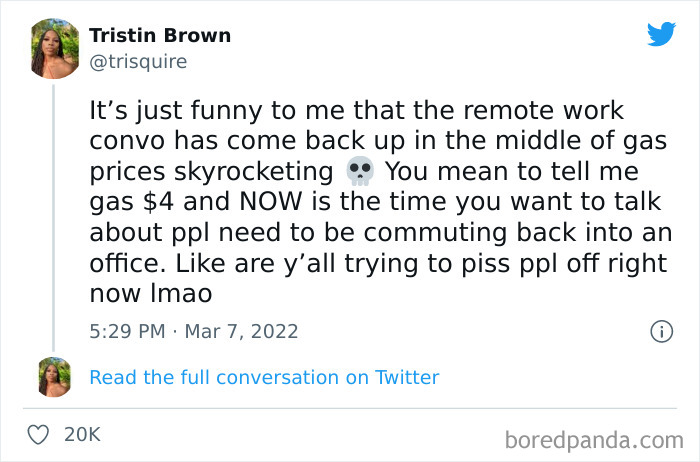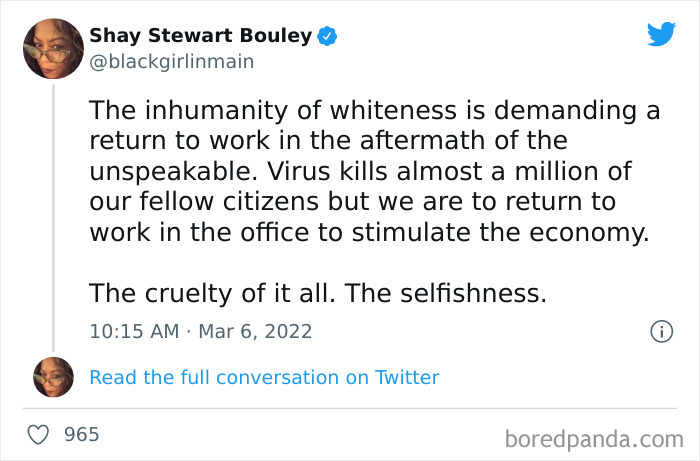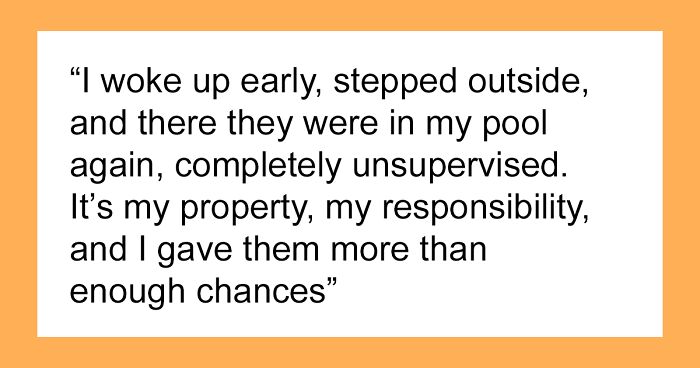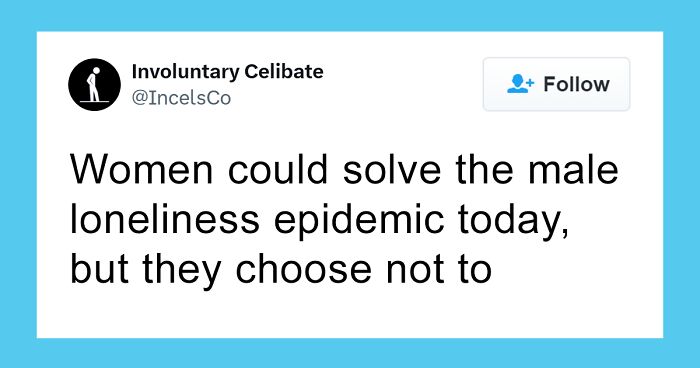President Joe Biden used part of his State of the Union address to urge employees to go back to offices, saying it was time to "fill our great downtowns again."
"We can end the shutdown of schools and businesses," the president claimed. "We have the tools we need."
However, people aren't feeling too psyched about it. With so many having successfully proved they can perform their tasks just as well (if not better) working remotely and gas prices continuing to rise due to Russia's invasion of Ukraine, it's no wonder some don't like the decision. To better understand the reasons why, we took a look at social media where users have been voicing their complaints.
This post may include affiliate links.
Gallup's State of the Workforce study conducted in May/June with more than 9,000 American workers found that 91% of workers in the U.S. working at least some of their hours remotely were hoping their ability to work at home would persist after the pandemic.
Hybrid work was most preferred. Overall, 54% of respondents said they would ideally like to split their time between working at home and in the office. A little over a third (37%) would like to work from home exclusively, while just 9% wanted to return to the office full time.
That's just smart. Especially these days where the employees don't want free pizza Friday and a 20cent raise. They will quit for better conditions, benefits and not being forced to chit chat with random colleagues is a huge massive bonus. I think it's unreasonable to discuss anything not work related in work. I work there, I don't need friends and I have my own family. To point out any company who mentions we are family, RUN. Most families are toxic and dysfunctional even if pleasant there's always some skeletons. I decline to have my own family or work family part of my daily activities. All i come to do is my job for the paid time and then leave, no drinks, no chit chat, no games, after work team building etc. No no no. CEO is right!
Time preservation was the key reason for wanting to work remotely:
Not having to commute, needing the flexibility to balance work and personal obligations, and improved wellbeing (which likely results from having more time) were the top-cited reasons for preferring remote work.
3 in 10 employees working remotely said they are extremely likely to seek another job if their company eliminates remote work.
Where I work, they've divided the "work from the office crowd" in 3 groups. Group 1: those that have to work from the office (they never stopped going in), group 2: those that want to go in the office (they are planning their return) and group 3: those who don't want to go back (we may have to go in once every 2 weeks... maybe...)
While most workers didn't think remote work will improve their office culture, they didn't think it will hurt it either. Two-thirds of all full-time U.S. employees thought that having people work remotely long term will have either no effect or a positive effect on their workplace culture; the remaining third thought it will be negative.
"The data runs counter to the idea that always being in the office is the best way to foster culture," Brian Elliott, the Future Forum's executive leader and Slack senior vice president, said. "Using digital tools is really important to building a culture for people who aren't the average white male executive. Companies that invest in modern tools and in rethinking how they bring people together will do better than those insisting on full-time office work."
The Future Forum, developed by workplace-messaging platform Slack, surveyed more than 10,000 workers globally in the summer of 2021 and found an "executive-employee disconnect" with regard to returning to work. Three-quarters of all executives reported they want to work from the office three to five days a week, compared with about one-third of employees. Among executives who have primarily worked completely remotely through the pandemic, 44% said they wanted to come back to the office every day. Just 17% of employees said the same.
Most executives (66%) also reported they were designing post-pandemic workforce policies with little to no direct input from employees.
I've been working from home for 2.5 years now. I also am dealing with spinal issues that put me in the hospital last month. If I had to go in 5 days a week, I'd have to consider going out on disability. Working from home means I can keep working full-time. Even if some days that means taking more breaks and working later to make up the time. We have been called back into the office for 8 days a month next month, I'm working with my doctor's office to get FMLA paperwork allowing me to continue working from home.
Bringing people back to the office for chance meetings in an elevator or by the water cooler, according to Elliott, is "mythology."
Still, it's possible those interactions are much more valuable to an executive than to an employee — further leading to the disconnect, said Amy Zimmerman, chief people officer at Relay Payments, which has worked with founders and executives to develop and nurture culture.
I think I have FINALLY figured out what irks me so much about these interactions. (I'm autistic, it takes me longer). It's that the bosses talk to the employees like they are parents or something. There is no sense that the interactions or of two equal adults. These so-called managers think they just have the right to issue commands and the other person has to obey. That's just not how it works in the professional world. As indicated by the other person just quitting. Wish everyone who was treated this way had the same options.
By the time you arrive at your work you could already have worked 2 hours. If everyone promised to work 5 hours per week extra for free if they could WFH, all the employers would stop pressuring people to come in.
Zimmerman highlighted that older executives rely on face-to-face communication to get a better sense of what's going on throughout their organizations; they also may have more need for those chance conversations to keep tabs on a large number of employees.
"I've worked with a CEO who told me he just liked the energy of the office," Zimmerman recalled. "There was something about seeing the cars in the parking lot that brought him joy. The fact is, corporate America is likely changed forever. You're making a huge mistake if you're requiring folks back in office full time, because they see the progress most companies have made in the last two years, and they'll ask, 'why?' It feels like micromanagement."
The only pro of an office space is that the employer has better control over the employees. That's also the only reason why those employers don't want their staff to work from home. Has got nothing to do with "team play" or "short lines of communication", it's all about control.
I so wish that I had the skills to work from home. I run a biofuel plant, and gotta be there. I like my job, but f**k I hate that place. Been out with a back injury for a week, and oddly enough it's still the best week I've had in years. Since my kids were little, at least.
Over 90% of employers are planning to adopt a hybrid model this year, according to recent research from tech consulting firm Gartner – but researchers expect several high-profile companies to "change course" in the months ahead and demand that employees return to the office full-time, citing high turnover rates and a perceived loss of organizational culture.
I guess they can write off more on taxes than they can collect in rent.
Exactly! Remote work is now a priority when looking at a job. If my current job force a return to the office, I'll quit in an instant since there's a lot of opening in my field. For now, my boss seems to want people back for "socializing" and "team building via socializing" purpose only. I call BS, they just don't want their nice office space to be wasted with nobody in it.
“We’ve been learning to work remotely either part or all of the time on the fly during this crisis,” Peter Cappelli, a professor at the University of Pennsylvania’s Wharton School of Business, said. “There’s a lot of moving parts that are difficult to manage, too, without being able to predict with full confidence what the consequences will be: What if employees don’t agree on what days to come in, or how do you equally measure the performance of people who are remote vs. in the office, avoiding proximity bias?”
I think for most people the commute is the biggest con. It sets your routine but the traffic and cost isn't worth it.
This in a nutshell. In a lot of cases (mine included) it's more about the senior management team not trusting their employees to do their jobs at home unsupervised. I mean no one needs a manager who specialises in micromanagement if their workforce is working from home. Our place is also now trying to introduce timesheets / metrics, it's like living through the 90s all over again
Companies might consider, he added, either transitioning to be remote or in-office full-time to avoid such spots. "Moving toward a hybrid workforce is pretty complicated to figure out, and nobody knows quite how well it works for an organization because it’s still so new for most employers."
As we can see, people working from home have said it's helped them maintain a better work-life balance, manage childcare responsibilities and be more productive, among other benefits, but sadly, such praises might not be enough to prevent companies from pushing a return to the office.
If the pandemic taught us anything, it’s that most office workers can do the work from home, even better. I personally cannot work from home because of the nature of my job, but I fully support if you do. If your company doesn’t support it, luckily there are many others that do. There are countless remote jobs out there you can choose from.
It's the same thing said in different ways. Many white collar jobs do not require a physical presence. For companies paying huge amounts in rent and utilities, having your team free up those costs is beneficial to everyone. But every blue-collar and manual labour job doesn't have that option. And then there are all the people who could technically do their job remotely but can't (teachers for example), because we depend on their presence in order for us to do our jobs.
WFH is good for both the folks whose jobs can be done from home and those whose jobs require us to come in. If you have to go in, less people making small talk, less traffic, smaller lines for lunch, less micromanaging, the list goes on. You'd think these companies would like offloading their electric and internet costs. Bringing people back is about control. Same as tying your healthcare to your job. If you can WFH and your company is forcing you back, quit. Make this a hill to die on. It's better for the environment, for the people, and for the country (except the businesses that rely on people that commute. But bugger them. After capitalism, right ((lol))).
I posted a graph above showing that actually the WFH thing if anything has been great for capitalism, so share away.
Load More Replies...If the pandemic taught us anything, it’s that most office workers can do the work from home, even better. I personally cannot work from home because of the nature of my job, but I fully support if you do. If your company doesn’t support it, luckily there are many others that do. There are countless remote jobs out there you can choose from.
It's the same thing said in different ways. Many white collar jobs do not require a physical presence. For companies paying huge amounts in rent and utilities, having your team free up those costs is beneficial to everyone. But every blue-collar and manual labour job doesn't have that option. And then there are all the people who could technically do their job remotely but can't (teachers for example), because we depend on their presence in order for us to do our jobs.
WFH is good for both the folks whose jobs can be done from home and those whose jobs require us to come in. If you have to go in, less people making small talk, less traffic, smaller lines for lunch, less micromanaging, the list goes on. You'd think these companies would like offloading their electric and internet costs. Bringing people back is about control. Same as tying your healthcare to your job. If you can WFH and your company is forcing you back, quit. Make this a hill to die on. It's better for the environment, for the people, and for the country (except the businesses that rely on people that commute. But bugger them. After capitalism, right ((lol))).
I posted a graph above showing that actually the WFH thing if anything has been great for capitalism, so share away.
Load More Replies...
 Dark Mode
Dark Mode 

 No fees, cancel anytime
No fees, cancel anytime 



